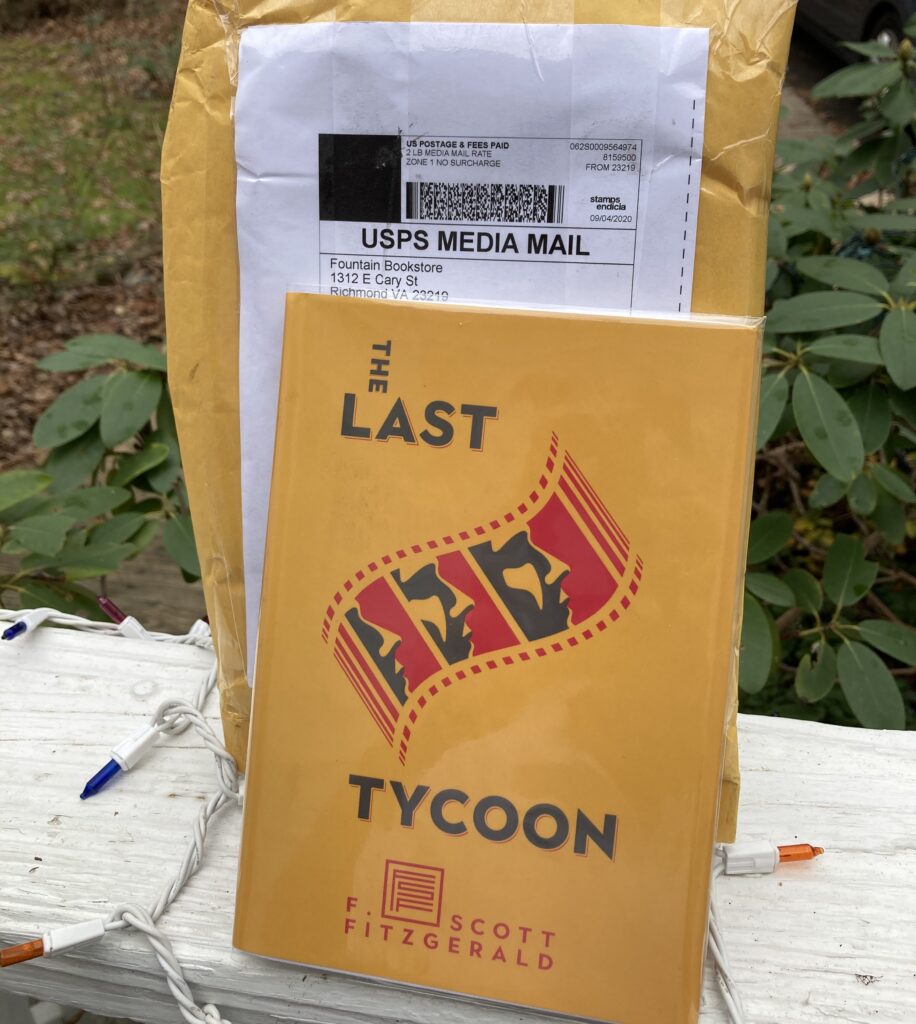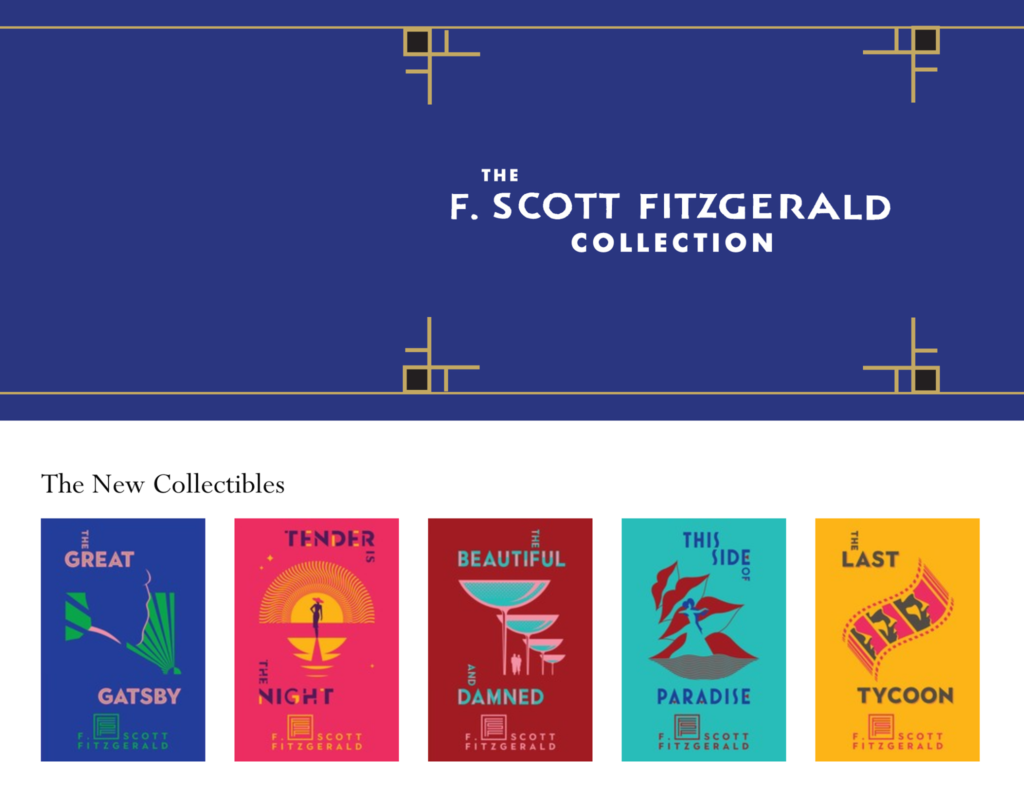The Last Novel
Fitzgerald died before his masterpiece-in the making, The Last Tycoon, could be finished
- 5th month of F. Scott Fitzgerald reading challenge, 5th novel, The Last Tycon (1941).

F. Scott Fitzgerald’s first of five novels, This Side of Paradise, turned 100 in 2020 and new “Collector’s Editions” came out from his old publisher Scribner, now part of Simon & Schuster. The more likely motivation for the new editions, however, is that the brilliant and lucrative Gatsby now has slipped into the public domain, as of January 1, and Scribner understandably wanted one last cash grab. Everyone and his brother is publishing The Great Gatsby for 2021 and some are putting out their own Gatsby “prequels,” as well, hoping to ride Fitzgerald’s coattails to fame and fortune, though — safe bet here — their books won’t be as good.
Point is, these new Scribner editions, combined with Independent Bookstore Day on Aug. 29, gave me an excuse to finally read them all. I ordered one each from five of my favorite indies, to read one a month. (Shoutout here to Fountain Bookstore in Richmond, Va., for Tender is the Night.)
1. WHY DIDN’T HE FINISH IT?
Drinking, in a word. Fitzgerald would die of a heart attack in 1944, at the age of 40, following decades of alcoholism that became nearly as much of his legacy as his writing. He was roughly midway through The Last Tycoon at the time. The book was a fictionalized story of famed movie producer Irving Thalberg—Monroe Stahr in the novel—and it reflected some of what FSF had learned during two years of Hollywood screenwriting. MGM fired the ill-suited genius in 1939—Director Billy Wilder likened the gig to that of “a great sculptor who is hired to do a plumbing job”—and Fitzgerald’s downward spiral picked up speed. After his death, friend and literary critic Edmund Wilson edited the manuscript and Fitzgerald’s notes for the book’s publication in 1941.
2. TYCOON IS DIFFERENTLY BRILLIANT
Some of The Last Tycoon is told in the first-person by college student Cecelia Brady, whose father Pat (modeled after Louis B. Mayer), is Stahr’s partner. Some of it is told in the third-person.
Stahr, Hollywood’s boy wonder, is slowly killing himself under the pressure of work, as well as his continued grieving over the death of his wife, Minna. Cecelia is attracted to him but he is little to him, at least initially. He does find an instant attraction to Kathleen, in no small part because she looks remarkably like Minna.
Notably, Fitzgerald’s final book seems to incorporate more dialogue and less description than its rich predecessors, perhaps influenced by his dialogue-writing. The long scenes of Stahr enticing the best work out of his underlings, almost with Socratic-like engagement, are compelling.
Still, there is perhaps no better phrase-turner in American literature than FSF and Tycoon, though unfinished and unpolished, does not disappoint.
This, for instance:
“These lights, this brightness, these clusters of human hope, of wild desire—I shall take these lights in my fingers. I shall make them bright, and whether they shine or not, it is in these fingers that they shall succeed or fail.”

Or this:
“He saw Kathleen sitting in the middle of a long white table alone. Immediately things changed. As he walked toward her the people shrank back against the walls till they were only murals; the white table lengthened and became an altar where the priestess sat alone. Vitality welled up in him and he could have stood a long time across the table from her, looking and smiling.”
Though unfinished, the extant work the writer left behind show what might have been ahead. “These chapters show great promise and provide a tantalizing glimpse of Fitzgerald’s spare, mature style,” writes James L.W. West III, editor of The Cambridge Edition of the Works of F. Scott Fitzgerald, in the short biography that closes the book.
They do indeed.
3. THE BOOKS, READ FOR GENERATIONS, WILL BE READ FOR MORE
He’s often considered the premier chronicler of the “Roaring 20’s,” but Fitzgerald was more. As West notes, “his romantic readiness for life and his gift for hope have come to embody important elements of the American identity; he was among the first to recognize his country’s dreams of infinite possibility.” He wrote of ambition, of success and failure, and sometimes of redemption.
His stylized use of language, too, continues to enthrall. Ranking great works of literature, and their creators, is a dicey business but Fitzgerald comes off well. The Modern Library attempted a “100 Best Novels” list in 1998 and placed The Great Gatsby at the exalted No. 2 position (behind only Joyce’s Ulysses). Moreover, Tender Is the Night came in at 28th.
All of this may be considered ironic considering Fitzgerald’s first novel, This Side of Paradise, was the one that most startled the literary world and was the best-seller of his five. His earliest writings, especially, whether novels or short stories written for lucrative magazine checks, gained a wide audience. But by the end of his life, Fitzgerald’s works were passed over more often than not.
In the notes he left for The Last Tycoon, Fitzgerald famously wrote, “There are no second acts in American lives.” Yet, as West pointed out, “his own life has been resurrected and reexamined by biographers and historians. . . . His works and life continue to fascinate us, and his reputation continues to grow.”
With, I now know, reason.

This Side of Paradise (1920), from DOWNTOWN BOOKS, Manteo, N.C.
The Beautiful and The Damned (1922), from BUXTON VILLAGE BOOKS, Buxton, N.C.
The Great Gatsby (1925), from BOOKS TO BE RED, Ocracoke, N.C.
Tender Is the Night (1935), from QUARTER MOON BOOKS & GIFTS, Topsail Beach, N.C.
The Last Tycoon (1941). from FOUNTAIN BOOKSTORE, Richmond, Va.